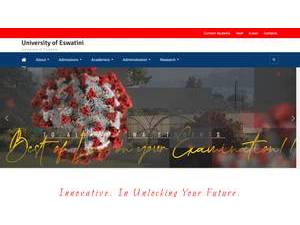
Overview
Established in 1976, the University of Eswatini is a non-profit public higher education institution located in the urban setting of the large town of Matsapha (population range of 10,000-49,999 inhabitants), Manzini. This institution also has a branch campus in Luyengo and Mbabane. Officially recognized by the Ministry of Education and Training of Eswatini, University of Eswatini (UNESWA) is a medium sized (uniRank enrollment range: 7,000-7,999 students) coeducational Swazi higher education institution. University of Eswatini (UNESWA) offers courses and programs leading to officially recognized higher education degrees such as pre-bachelor's degrees (i.e. certificates, diplomas, associate or foundation), bachelor's degrees, master's degrees and doctorate degrees in several areas of study. See the uniRank degree levels and areas of study table below for further details. This 49-year-old Swazi higher-education institution has a selective admission policy based on students' past academic records and grades. The acceptance rate range is 80-89% making this Swazi higher education organization a least selective institution. International applicants are eligible to apply for enrollment. UNESWA also provides several academic and non-academic facilities and services to students including a library, housing, sports facilities, online courses and distance learning opportunities, as well as administrative services.
University Snapshot
Control
![]() public
public
Entity
![]() non-profit
non-profit
Size
![]() medium sized
medium sized
Selectivity
![]() least selective
least selective
University Identity
| Name | University of Eswatini |
|---|---|
| Name (English) | |
| Name (Non Latin) | |
| Acronym | UNESWA |
| Founded | 1976 |
| Motto | Umculu Sisekelo Sesive The Scripture is the Pillar of the Nation |
| Colours | Red, white, gold and blue |
| Mascot | |
| Screenshot |  |
| Video Presentation |
University Location
| Address | Private Bag 4, Kwaluseni Matsapha M201 Manzini Eswatini |
|---|---|
| Location Map and Satellite View | |
| 2517 0000 | |
| 2518 5276 | |
| Other locations | Luyengo and Mbabane |





Social Media
Introduction
Social media can be a powerful tool for Universities to communicate with current students, alumni, faculty, staff and the wider community. But how can social media be important for prospective students? Read our article about the importance of Social Media for universities and prospective students to learn more.
Social Media
uniRank publishes brief reviews, rankings and metrics for some of University of Eswatini's social media channels as a starting point for comparison and as an additional selection tool for potential applicants.
University of Eswatini's Facebook page review
University of Eswatini's X page review
n.a.
University of Eswatini's Instagram page review
University of Eswatini's official LinkedIn profile
n.a.